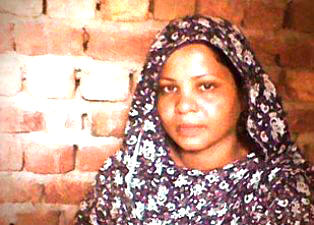Asia Bibi's husband distraught after court upholds death sentence: 'How can I tell my children their mother is not free?'

British Pakistani Christians were meeting on Saturday to protest outside 10 Downing Street against a Pakistani court's decision to uphold the death sentence of Christian mother Asia Bibi.
Bibi, 50, was convicted of blasphemy in 2010, a crime that carries the death penalty in Pakistan. She was first arrested in June 2009 in Ittanwalai village, near Lahore, after colleagues claimed she had insulted the Prophet Muhammad.
High profile Pakistani politicians Salmaan Taseer and Shahbaz Bhatti spoke up in her defence and were subsequently assassinated in 2011, Taseer by his own security guard and Bhatti by the Pakistani Taliban.
Bibi's husband, Ashiq Masih, told Shamim Masih of the British Pakistani Christian Association: "This appeal was [a] ray of hope but the rejection of the appeal has shattered my confidence in the Pakistani legal system."
According to Shamim Masih, Ashiq Masih was "weeping bitterly" when he met him after the hearing and told him Muslim clerics attending the hearing had shouted out "blasphemer" and "kill her".
"I have not told my children about the court decision. How can I? I am too scared of their reaction - they are already very depressed. We all were expecting her to come home and now this happens," said Ashiq Masih.
"How can I tell my children their mother is not free? This will kill them."
Christians around the world have reacted with dismay to the news. Bishop Rufin Anthony, of Islamabad and Rawalpindi, is appealing to Christians everywhere to pray for Bibi. He said the court's decision was "heartbreaking", Vatican Radio reports.
Bibi's lawyer, Sardar Mushtaq, told Associated Press they have 30 days to appeal.
"We will continue this legal battle by approaching the Supreme Court of Pakistan," he said.
Pakistani Christians will be praying for Bibi this Sunday and are asking Christians around the world to remember her in their own prayers.
In neighbouring India, the Bishop of Pune, Mgr Thomas Dabre wrote in AsiaNews that the international community should hold the Pakistani government accountable.
"The Pakistan government cannot disown responsibility of this death sentence and should overturn immediately the death sentence of innocent Christian woman Asia Bibi," he said.
"I would expect international authorities and bodies to make the Pakistan government withdraw this punishment as well as these draconian blasphemy laws, which betrays a mindset that are against present day affirmation of human rights."
Amnesty International's Deputy Asia Pacific Director David Griffiths said the court's decision to uphold her death sentence was a "grave injustice".
"Asia Bibi should never have been convicted in the first place – still less sentenced to death – and the fact that she could pay with her life for an argument is sickening," he said.
"The laws are often used to settle personal vendettas – both against members of minority religious groups and Muslims – while individuals facing charges are frequently targeted in mob violence.
"Those who speak out against the laws face terrible reprisals. However, the blasphemy laws violate international law and must be repealed or reformed immediately to meet international standards."
Writing in the Guardian, Samira Shackle said that in spite of the misapplication of Pakistan's blasphemy laws, reform is not coming because of the power of extremist groups in Pakistan and the extent of public sympathy for their ideologies.
"The targeting of anyone who speaks out about blasphemy laws has had a chilling effect, and even outspoken liberal voices are reluctant to make the case for reform publicly," she said.
"While this self-censorship is entirely understandable in a country where the authorities provide little protection, it gives extremist ideas the space to flourish and grow. Without people in the halls of power willing to stand up and call for change, there is little hope for Bibi."
Christian Solidarity Worldwide said the conditions experienced by Bibi on death row had been "gruelling", with much of the last four years spent in solitary confinement.
"Her health has suffered and she has had severe restrictions on visitors. This is in part due to security concerns, as blasphemy law victims are prone to violent abuse. There has been a lack of progress in her case, with five hearings cancelled this year alone, as well as the intimidation of judges and lawyers," CSW said.











